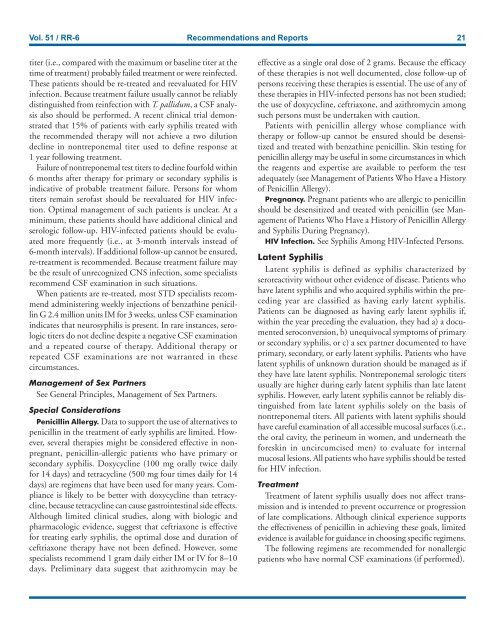You also want an ePaper? Increase the reach of your titles
YUMPU automatically turns print PDFs into web optimized ePapers that Google loves.
Vol. 51 / RR-6 Recommendations and Reports 21<br />
titer (i.e., compared with the maximum or baseline titer at the<br />
time of treatment) probably failed treatment or were reinfected.<br />
These patients should be re-treated and reevaluated for HIV<br />
infection. Because treatment failure usually cannot be reliably<br />
distinguished from reinfection with T. pallidum, a CSF analysis<br />
also should be performed. A recent clinical trial demonstrated<br />
that 15% of patients with early syphilis treated with<br />
the recommended therapy will not achieve a two dilution<br />
decline in nontreponemal titer used to define response at<br />
1 year following treatment.<br />
Failure of nontreponemal test titers to decline fourfold within<br />
6 months after therapy for primary or secondary syphilis is<br />
indicative of probable treatment failure. Persons for whom<br />
titers remain serofast should be reevaluated for HIV infection.<br />
Optimal management of such patients is unclear. At a<br />
minimum, these patients should have additional clinical and<br />
serologic follow-up. HIV-infected patients should be evaluated<br />
more frequently (i.e., at 3-month intervals instead of<br />
6-month intervals). If additional follow-up cannot be ensured,<br />
re-treatment is recommended. Because treatment failure may<br />
be the result of unrecognized CNS infection, some specialists<br />
recommend CSF examination in such situations.<br />
When patients are re-treated, most STD specialists recommend<br />
administering weekly injections of benzathine penicillin<br />
G 2.4 million units IM for 3 weeks, u<strong>nl</strong>ess CSF examination<br />
indicates that neurosyphilis is present. In rare instances, serologic<br />
titers do not decline despite a negative CSF examination<br />
and a repeated course of therapy. Additional therapy or<br />
repeated CSF examinations are not warranted in these<br />
circumstances.<br />
Management of Sex Partners<br />
See General Principles, Management of Sex Partners.<br />
Special Considerations<br />
Penicillin Allergy. Data to support the use of alternatives to<br />
penicillin in the treatment of early syphilis are limited. However,<br />
several therapies might be considered effective in nonpregnant,<br />
penicillin-allergic patients who have primary or<br />
secondary syphilis. Doxycycline (100 mg orally twice daily<br />
for 14 days) and tetracycline (500 mg four times daily for 14<br />
days) are regimens that have been used for many years. Compliance<br />
is likely to be better with doxycycline than tetracycline,<br />
because tetracycline can cause gastrointestinal side effects.<br />
Although limited clinical studies, along with biologic and<br />
pharmacologic evidence, suggest that ceftriaxone is effective<br />
for treating early syphilis, the optimal dose and duration of<br />
ceftriaxone therapy have not been defined. However, some<br />
specialists recommend 1 gram daily either IM or IV for 8–10<br />
days. Preliminary data suggest that azithromycin may be<br />
effective as a single oral dose of 2 grams. Because the efficacy<br />
of these therapies is not well documented, close follow-up of<br />
persons receiving these therapies is essential. The use of any of<br />
these therapies in HIV-infected persons has not been studied;<br />
the use of doxycycline, ceftriaxone, and azithromycin among<br />
such persons must be undertaken with caution.<br />
Patients with penicillin allergy whose compliance with<br />
therapy or follow-up cannot be ensured should be desensitized<br />
and treated with benzathine penicillin. Skin testing for<br />
penicillin allergy may be useful in some circumstances in which<br />
the reagents and expertise are available to perform the test<br />
adequately (see Management of Patients Who Have a History<br />
of Penicillin Allergy).<br />
Pregnancy. Pregnant patients who are allergic to penicillin<br />
should be desensitized and treated with penicillin (see Management<br />
of Patients Who Have a History of Penicillin Allergy<br />
and Syphilis During Pregnancy).<br />
HIV Infection. See Syphilis Among HIV-Infected Persons.<br />
Latent Syphilis<br />
Latent syphilis is defined as syphilis characterized by<br />
seroreactivity without other evidence of disease. Patients who<br />
have latent syphilis and who acquired syphilis within the preceding<br />
year are classified as having early latent syphilis.<br />
Patients can be diagnosed as having early latent syphilis if,<br />
within the year preceding the evaluation, they had a) a documented<br />
seroconversion, b) unequivocal symptoms of primary<br />
or secondary syphilis, or c) a sex partner documented to have<br />
primary, secondary, or early latent syphilis. Patients who have<br />
latent syphilis of unknown duration should be managed as if<br />
they have late latent syphilis. Nontreponemal serologic titers<br />
usually are higher during early latent syphilis than late latent<br />
syphilis. However, early latent syphilis cannot be reliably distinguished<br />
from late latent syphilis solely on the basis of<br />
nontreponemal titers. All patients with latent syphilis should<br />
have careful examination of all accessible mucosal surfaces (i.e.,<br />
the oral cavity, the perineum in women, and underneath the<br />
foreskin in uncircumcised men) to evaluate for internal<br />
mucosal lesions. All patients who have syphilis should be tested<br />
for HIV infection.<br />
Treatment<br />
Treatment of latent syphilis usually does not affect transmission<br />
and is intended to prevent occurrence or progression<br />
of late complications. Although clinical experience supports<br />
the effectiveness of penicillin in achieving these goals, limited<br />
evidence is available for guidance in choosing specific regimens.<br />
The following regimens are recommended for nonallergic<br />
patients who have normal CSF examinations (if performed).


